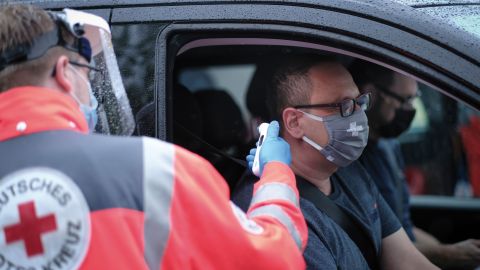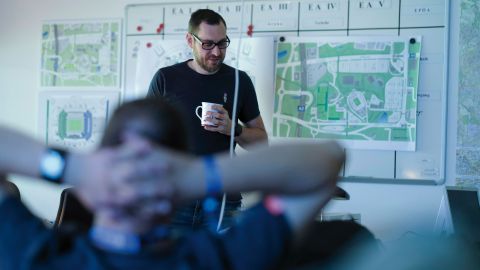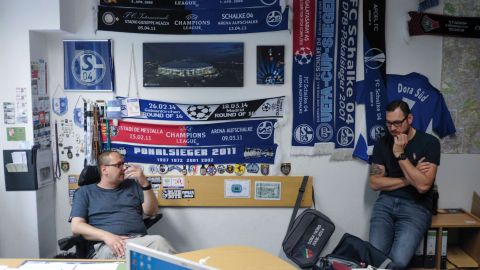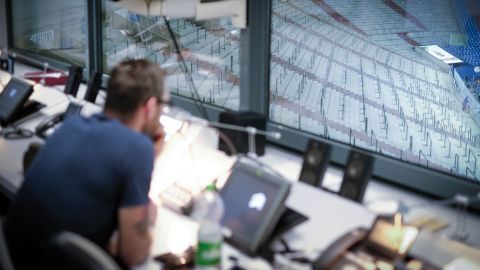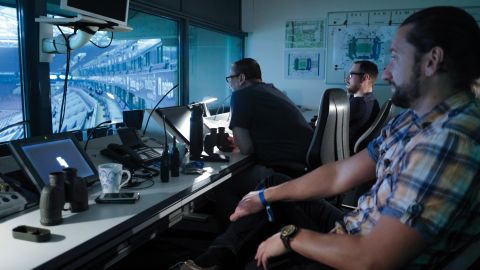Marc Bauer and Dirk Maluchnik work as "scene knowledge officers" (SKB) for the Gelsenkirchen police. Their area of responsibility is Schalke, or more precisely its blue and white fans. "Before the match days, we use our contacts at the club and in other networks to gather information and create a picture of the situation: how many supporters are traveling in total, what is the situation with the so-called 'problem fans', what else needs to be considered, etc.," explains Bauer (43), who has been doing the job for 13 years.
Well, this time it's only against Bayer Leverkusen. "Vizekusen" or "Pillekusen" (in reference to Bayer AG, which owns the club), as some soccer fans say pejoratively. Not against Bayern or even the hated Black & Yellows. And Schalke's performance since the Bundesliga restart after the coronavirus break also leaves a lot to be desired. Up until this game in mid-June, the Gelsenkirchen club had picked up just one point from five games. All reasons for the complete emptiness that spreads in front of Marc Bauer and Dirk Maluchnik on this rainy Sunday afternoon.
On the basis of their assessment, decisions are then made, for example, on how the deployment sections in and around the Veltins-Arena should be structured and - of course - how many officials should accompany the match. If Freiburg or Augsburg are coming, 100 is usually enough, but if BVB are coming, at least ten times that number is needed. Or even better, a little more. On match days, Bauer, Maluchnik and the other SKB colleagues are out and about in plain clothes in the city hours before kick-off, checking where the (police-known) fan groups meet, how they move, what is different from usual, where problems or trouble are imminent. And intervene if necessary. This procedure is always the same, regardless of whether it's a normal game or a ghost game.
Into the car and off towards the potential hotspots: to the old industrial warehouse where the "Ultras", the largest group of hardcore fans in terms of numbers, meet; to the former disco near the main station that the "Hugos" have taken over; to the small pub between the city center and the arena that houses the "Gelsen scene". The same picture everywhere: nobody there. No fans, nowhere. Could it be the bad weather? No, says Dirk Maluchnik, who everyone just calls "Malle" and who has been part of the SKB squad for six years. "The fan groups have spoken out in favor of ending the season, ghost games are not acceptable to them. So they're staying at home." This is also confirmed by one last trip through the city.
What the two colleagues experience in the middle of the Ruhr area also applies in one way or another to the other soccer strongholds in NRW such as Cologne, Dortmund and Düsseldorf. In general, football fans have behaved responsibly since the Bundesliga resumed. Neither at the stadiums nor in the city centers were there any significant violations of the Corona protection regulations or criminal law provisions. "I have to praise the fans. Despite all the understandable emotions, it was genuine fair play," emphasized NRW Minister of the Interior Herbert Reul. The match days have shown that health protection and soccer enthusiasm can be combined in these difficult times. As on this dark Sunday in Gelsenkirchen, no soccer fans were detected in the vicinity of the stadiums or in the city area at the vast majority of matches. Instead, fans watched the matches on television and radio.
Before corona, however, tens of thousands of fans flocked to the arena, which opened in the summer of 2001. Bauer and Maluchnik would mingle with them and stay nearby during the game so that they could intervene if trouble threatened. For example, in a classic case of "group dynamic incidents": Blue and white fan groups move towards the visitors' block. "Thanks to our experience, we can assess quite well whether it is still worth communicating with the leaders of the groups to try and calm the situation," says Bauer. "Or whether the deployment of closed units is necessary as a last resort." Overall, however, the relationship between the SKBs and Ultras and co. has improved recently - at least at Schalke.
Today, something completely different is needed: There are rumors that some fans want to vent their anger about the miserable performance of Schalke's eleven and confront the players on their way from the hotel to the stadium. Because the players' quarantine accommodation is just around the corner, the team will make this short journey on foot rather than in the team bus. Bauer and Maluchnik are on hand, but the supporters clearly don't have the energy for this protest either - once again, no one is there.
The officials, one a Schalke fan, the other a "sympathizer", watch the game from the command post. The room with a view of the pitch and stands contains, among other things, the cameras that help identify the rioters in the event of a riot. After the final whistle (the game ends 1:1), the police officers have a final tour of the Ruhr metropolis. Unsurprisingly, the situation has not changed. All of this is recorded in the progress report and the entire operation is carefully written down. Then it's over. Another 6-day week lies behind the officers.
At the farewell, Maluchnik hands over his business card. It reads "Dirk Maluchnik - scene expert/spotter". "In English, 'spotter' is our job title. We used to work at international matches," he explains. "But that was some time ago now." And the way things are going at Schalke at the moment, Milan, Madrid and co. are unlikely to be among the locations where the two officials will be working in the near future.
